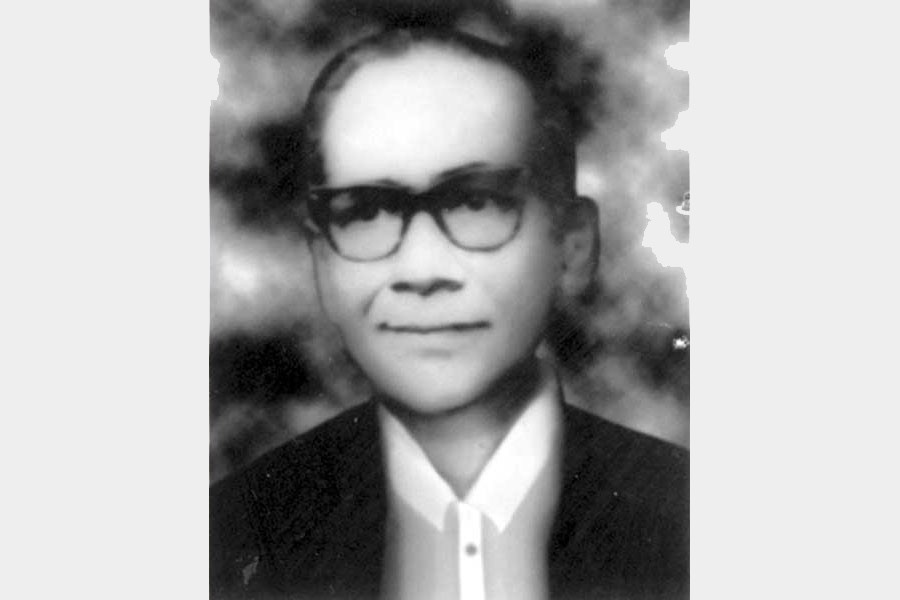I met Justice Murshed in his twilight years when he had become frail and ailing, yet one could notice his greatness and the respect he commanded. Having been introduced by the late Shamsur Rahman as a young poet, whenever I went to see him he would recite poetry whether it was from Tagore, Tennyson, Keats, Shelley or Sufi poets like lqbal, Hafiz or Sheikh Saadi. Justice Murshed was versatile in his knowledge of poems, among many other things. Yet today, after four decades of Murshed's death, his recited verses still haunt me.
Syed Mahbub Murshed was undoubtedly among the most striking public figures that appeared in our national scene. Born in 1911 in a distinguished Muslim family of Bengal, he had shown signs of his vastly talented abilities from an early age. The late playwright and litterateur Prof Nurul Momen, recalls in his essay the precocity of the youthful Murshed in his Presidency College days in Calcutta.
After a brilliant academic career both in the Subcontinent and England, Syed Mahbub Murshed began his career as a lawyer in the late thirties of last century. He soon made his mark in the Calcutta Bar. His attachment to the Bar and to members of the legal profession lasted till the end of his days. Later on in life, while serving as Chief Justice in the bench. He would talk nostalgically about the Bar. "The Bar", he said, "is my professional home, a place where I shall continually return; even when I am dead my disembodied soul shall hover around the precincts of the Bar." His affection for people of his profession was deep. During his farewell speech from the bench after his premature retirement or resignation as Chief Justice, Murshed concluded concluded his speech to a standing ovation by stating "I salute you -- you who were my erstwhile comrades, the members of the Bar."
In 1954 Mahbub Murshed was elevated to the bench of the High Court of Dhaka. As a judge, Justice Murshed remained committed to his lifelong ideals of liberty, justice and excellence. His judicial pronouncements, delivered as a High Court Judge and briefly in the Supreme Court and then as Chief Justice clearly reflected these ideals. Some of Justice Murshed's judgements created constitutional history and won for him not only national fame but also international acclaim. He will always be remembered for fearlessly upholding the rule of law. He remained a reflection of courage despite pressures from the highest quarters. As Chief Justice he stated in a Judgement that "it is not the use but the abuse of Power that the Courts are meant to redress." Hence, he will remain a Titan in the Judicial arena of South Asia for his landmark judgements.
I would like to point out some other examples of Murshed's manifold social cultural and political activities. A master in oratory Murshed would hold his audience spell-bound by his eloquent speeches. Being a humanitarian all his life the famine that griped Bengal in the early forties of the last century and the communal riots in 1946 moved him to found the Anjuman Mofidul Islam. As a sitting Judge in the fifties he worked relentlessly as Chairman of the Red Cross. Murshed also fought for our cultural freedom as he organised Tagore centenary functions, despite the obstacles he faced from the then Pakistani military leadership.
In the political arena Murshed will remain unparalleled. As a young Barrister in 1942 Murshed's article "Quo Vadis Quaid Quaid-e-Azam" criticising Mr Jinnah and defending his uncle Mr Fazlul Haque that appeared in the Statesman of Calcutta created a stir in Bengal. After the partition of the Sub-continent in 1947 due to communal violence that spread Murshed was among the persons who put to motion the process that culminated in the Nehru-Liaquat pact. He was drawn into the vortex of the language movement and along with his uncle the Sher-e-Bangla broke section 144 in 1952.
In early 1954, just before becoming a Judge, Murshed was involved with Abul Mansur Ahmed in drafting the manifesto for the Jukta Front.
On his resignation as Chief Justice among the first things Murshed did was to organise the defence of the Agartala Conspiracy case. Murshed participation in the mass upsurge in 1969 further earned him respect. His refusal to collaborate with the Pakistani military authorities during our war of liberation is also recorded.
Another significant matter was during President Ayub's Round Table Conference, Justice Murshed demanded one man one vote. Prior to this, in the National Assembly of Pakistan, there was a parity of 150 seats each for both the eastern and western wings. In 1977 he advised the late Ziaur Rahman to form what is now SAARC on the only occasion they had met. Hence Justice Murshed is a living history.
I conclude by saying about Justice Murshed what he had said about his uncle the Sher-e- Bangla, "In life and in death, he was a king without the trappings of a monarch, for he had built an empire in the hearts of his fellowmen".
K Sallahuddin is a retired official of Radio Bangladesh and a poet. He is also the secretary of the Syed Mahbub Murshed memorial committee.


